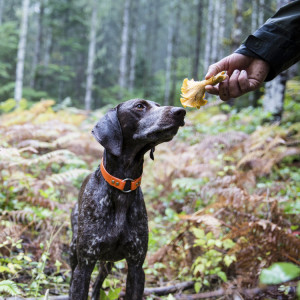Dogs Can Thrive on a Plant-Based Diet, a Study Says—But Is It Actually Good For Them?
Everything you need to know about the pros and cons of a veggie diet.

share article
For as long as dogs have been part of our families, we’ve taken for granted that they eat meat. After all, what are those big canine teeth for if not tearing up chunks of flesh? In recent years, the dog food industry seems to be getting even meatier, with human-grade raw ingredientsopens in a new tab a readily available option.
As pet parents’ understanding of what’s good for their pet evolves, what they feed them changes, too. On the opposite end of the spectrum, there’s been a proliferation of plant-based dog food across several brands. It makes sense; we love our pets as much as we love the rest of the family, and we want to give them the same treatment. If you go plant-based for the environment or your own health, you might want to pass on the benefits to your dog.
The environmental impact of pet food is difficult to quantify, as much of it is made from by-products. However, some researchopens in a new tab has suggested that U.S. dry cat and dog food emissions were 25 to 30 percent of emissions associated with providing food to U.S. citizens. Wet food causes opens in a new tabeight times as many emissions, which could give your dog the same carbon footprint as you.
Philip Steir creates alternative proteins for plant-based food company Earth Animalopens in a new tab. He says that reducing your dog’s meat consumption can significantly reduce their carbon paw print: “Plant-based foods generally have a lower environmental impact than meat production, preserving more natural resources and helping mitigate the effects of climate change, land use, deforestation, and biodiversity loss.”
Steir says that choosing plant-based options can be a compassionate choice for particularly eco-conscious pet parents. Recent studies suggest that dogs can in fact thrive on a plant-based diet. One studyopens in a new tab by Cold Springs Harbor Laboratory from 2023 claims to be the most comprehensive report on the topic so far.
They studied dogs on a plant-based diet at zero, six, and 12 months, checking their blood count, blood chemistry, cardiac biomarkers and other vitals. They found that all of the dogs maintained their health, backing up a 2022 studyopens in a new tab that found that pet parents reported no adverse outcomes when their dog was fed a plant-based diet. But how does this stack up long-term, particularly for dogs with additional needs?
So, should you feed your pup a plant-based diet?
While the ethical argument for plant-based pets is compelling, understanding the health impacts on your pet can be more complex. Is it actually any good for your dog? Steir believes that animals can experience similar advantages to humans when it comes to a plant-based diet.
“Plant-based foods are packed with essential vitamins and minerals, providing crucial antioxidants that combat oxidative stress and inflammation in the body,” he says. “These diets are rich in dietary fiber, promoting healthy digestion and regular bowel movements, maintaining a healthy gut microbiomeopens in a new tab, and reducing the risk of digestive issues such as constipation and diarrhea.” He goes on to say that plant-based diets are particularly effective for weight and allergy management in dogs.
The idea of putting your dog on a plant-based diet is relatively new. While there has been a boom in vegan dog food companies, there have also been loud detractors. At the heart of the argument is that both sides are passionate about doing what’s best for animals–but they disagree about what that is. One key difference in opinion is as to whether dogs are carnivores.
While cats are obligate carnivores, which means that they require the nutrients found in meat, dogs are omnivores and can eat and absorb nutrients from both meat and plants truth is more complicated. “Theoretically, dogs can follow a plant-based diet,” says dog nutritionist Selene Grandi, but she goes on to say that it’s incredibly easy to get the balance of nutrients wrong. Not only that, but dogs enjoy eating meat. “I’m one of those people who strongly believe that dogs have rights, and dogs love meat,” Grandi says.
Some excerpts are incredibly opposed to plant-based diets.
Anna Webbopens in a new tab, podcaster and dog nutrition expertopens in a new tab, is vehemently against the idea of dogs going on a plant-based diet. While evolution has made it more possible for dogs to digest plant food, Webb says that there are key differences between the digestive systems of our dogs and us.
“Humans can get protein from a lentil, but dogs need to eat a lot of animal fat and animal protein. Their digestive system is very short. It’s very acidic, whereas ours is very long and very alkaline,” Webb says. While dogs can eat opens in a new tabberries, fruits, and vegetables, Webb believes that those foods should comprise a maximum of 10 percent of their food bowl. When in doubt, says Webb, you should seek the input of a holistic vet or nutritionist.
Even vegan pet parents are conflicted. While I have been vegan for many years and have never eaten meat, I have always fed it to my dog. I have introduced some plant-based treats, but now that she’s 14 and still very healthy, I’m wary of changing what works. While animal welfare is central to my diet, hers is my absolute priority.
Bottom line: protein is a necessary part of your dog’s diet.
If you are considering trialing a plant-based diet, Steir says that it’s crucial to prioritize nutritional balance and ensure that all your pup’s dietary needs are met. “An essential and necessary step is consulting with an open-minded veterinarian or animal nutritionist who understands your goals and knows that dogs are biologically omnivorous,” Steir says. “Seeking professional guidance is particularly vital if you plan to make the food yourselfopens in a new tab, as they can help you design a complete and balanced diet.”
No matter what, Steir says that protein will always be a vital component of a dog’s diet. “Amino acids, the building blocks of protein, are what really matter. Dogs need 10 essential amino acids opens in a new tabfrom their food for optimal health, and they make up the protein in their diet.” It’s also important to incorporate a variety of bioactive superfoods, which can enhance your dog’s overall health.
Ensuring the presence of all essential fatty acids is also key to maintaining a healthy coat and skinopens in a new tab,” Steir says. According to the nutrient profilesopens in a new tab established by the Association of American Feed Control Officials (AAFCO), a nutritionally complete diet for adult dogs must contain at least 18 percent protein, and any dog food you choose should meet these minimum requirements. “Look for high-protein plant ingredients, such as lentils, beans, or legume,” Steir adds.
This is a good time to talk about the potential linksopens in a new tab between these ingredients, often found in grain-free dog foods, and a heart muscle disease called dilated cardiomyopathy (DCM). Dr. Lindsey Wendt told usopens in a new tab, however, that there is no definitive evidence that any one of these vegetables is to blame for DCM, though it’s important to be aware of this connection.
“There has been no significant association with DCM and a specific protein source. But in 91 percent of the cases, the affected dogs were on grain-free diets. In 89 percent of the cases, the diets included peas, and in 62 percent, they included lentils.” She goes on to caution: “Based on the strong connection between peas, in particular, and DCM, I would say there’s no benefit at this time to feeding your dog a diet with peas as a main ingredient source.”
Try incorporating more veggies.
Because dogs are omnivorous, there are benefits to incorporating more plant-based foods into their diet, even if you’re not planning to make any big switch. Steir cites food such as blueberries, turmeric, and leafy greens as key ingredients that could manage inflammation. Additionally, omega-3 fatty acidsopens in a new tab from sources like marine algae oils, kelp, flaxseed, and chia seeds support cardiovascular health without the high toxin levels sometimes found in fish. Steir adds that dogs’ genetic evolution has paved the way for their enhanced starch digestion, making it possible for them to absorb plants.
Every dog is different, and when making a decision about their nutrition, you should always consult with a trusted professional.
“A consultation with your veterinarian and regular checks to assess the dog’s health are mandatory. Do not change diet unless you are sure your dog is healthy and without knowing the risks of nutritional deficiencies,” Grandi says. When in doubt, always trust the professionals.
References:
Wet Pet Food Is Far Worse for Climate Than Dry Food, Study Findsopens in a new tab
AAFCO Methods For Substantiating Nutritional Adequacy Of Dog And Cat Foodsopens in a new tab
Owner Perception of Health of North American Dogs Fed Meat — or Plant-Based Dietsopens in a new tab

Marianne Eloise
Marianne Eloise is a writer for outlets like The Cut, the Guardian and the New York Times. She is also the author of an essay collection Obsessive, Intrusive, Magical Thinkingopens in a new tab. She has been going on adventures with her dog Bowie since she was 17.
Related articles
![invasive species dog treats]() opens in a new tab
opens in a new tab8 Invasive Species Treats That Are Welcome in Your Dog’s Bowl
The pet food industry wants to rebalance ecosystems one green crab treat and nutria snack at a time. Here are some options to shop from.
![Healing stone on Cavalier spaniel dog.]() opens in a new tab
opens in a new tab7 Human Wellness Trends Making Their Way Into the Pet Space
Your pet can benefit from your self-care practices, from CBD to acupuncture. (Yep, you read that right.)
![A dog sniffing a mushroom out of a hand.]() opens in a new tab
opens in a new tab6 Mushroom Superfoods that Won’t Turn Your Dog Into a Zombie
Nothing to fear here The Last of Us fans — ’shrooms are great immune-boosters.
![Puppy eating a bowl of blueberries]() opens in a new tab
opens in a new tab10 Superfoods to Share With Your Dog
From kale to quinoa, these nutrient-packed picks deserve a spot in your dog’s food bowl.
![A cat eating a plate of fish on a dining room table.]() opens in a new tab
opens in a new tabCould Fish Reduce Your Pet’s Carbon Footprint? It’s Complicated
All those cartoons of cats staring longingly at fish bowls might not be so far off. A new study suggests seafood in your pets’ diet could help sustainably meet the world’s protein needs.
![Chrissy Teigen and John Legend are celebrating their love for their furry friends with their first joint business venture: a pet food brand called Kismet.]() opens in a new tab
opens in a new tabIt’s Kismet: John Legend and Chrissy Teigen Launch a Lifestyle Pets Brand
The parents of four dogs put their in-home “focus group” to good use on this collab with the Street Vet.









